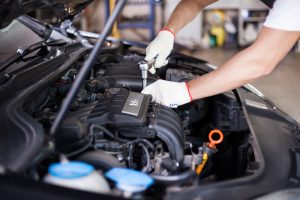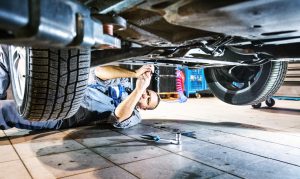One of the most commonly used credentials among auto mechanics is an ASE certification, which carries great weight in the industry. Some employers only look to hire new mechanics who hold an ASE credential. Earning an ASE certification is a process, although once that stamp of approval is earned, it enhances the status of an auto mechanic. It will also boost the chances of obtaining a higher-paying position. While an ASE certification is not mandated in any state, it is looked upon favorably within the industry. There are different kinds of ASE Certifications, all of which can lead to a bright future as an auto mechanic.
Featured Program:
Penn Foster Career School:
• Online Auto Repair Technician Career Diploma Program
National Institute for Automotive Service Excellence

ASE Certified Mechanic at Work
The ASE is short for the National Institute for Automotive Service Excellence. The ASE was first established in 1972 as a non-profit organization with the mission of improving vehicle repair and service through the means of testing and certifying automotive service professionals. The tests are considered to be difficult as only two of every three first-time test takers earn a passing score. The ASE certification has become a way of validating credibility to both employers and customers.
ASE Certifications
The ASE offers a variety of certifications, each of which requires a passing score on an individual examination. There are over 40 certification tests available and this collection covers all aspects of automotive repair. Here is a look at some of the individual ASE certifications.
Automobile and Light Truck Certifications
The most common ASE certification falls in the automobile and light truck distinction. These certifications recognize technicians who have the skill and knowledge required to work on cars and light trucks, which extend up to the class 3 level. There are eight individual certifications in this distinction and they are commonly known as the core eight. In order to earn any of the core eight certifications, a passing score must be earned on one of the eight individual tests, which include the following:
A1 Engine Repair
A2 Automatic Transmission/Transaxle
A3 Manual Drive Train & Axles
A4 Suspension & Steering
A5 Brakes
A6 Electrical/Electronic Systems
A7 Heating & Air Conditioning
A8 Engine Performance
Each test consists of anywhere from 40 to 50 questions. Once a certification is earned, a recertification must be taken in five years. However, the recertification exams are about half as long in duration. Earning all eight of these certifications will qualify mechanics to take claim master technician status.
When an exam is completed, each individual will receive a score report. This report shows the areas that have been mastered and the ones that are in need of improvement. This can help auto mechanics hone in on specific areas that may be lacking. Investing in courses that can help with passing certification exams is considered to be a wise investment and also evens out an auto mechanic’s overall knowledge. Test centers have strict security policies and require multiple forms of ID to ensure that no one is able to circumvent the process.
ASE Certification Work Experience Requirements
In order to earn an ASE certification, auto mechanics must fulfill work requirements, in addition to passing the exam. Those who have earned a two-year degree in automotive technology must also complete at least one year of experience working in automotive repair. Those who do not have an educational training must show proof of at least two years of work experience. The ASE provides a work experience form for those interested in taking a certification exam. Some certifications require more work experience than others. Click here for a detailed list of the work experience requirements that have been issued by the ASE.
The path to becoming an auto mechanic or technician generally does not start in a school or inside a repair shop. Many mechanics get their start by working on their own cars. It is not uncommon for young drivers to be short on cash and that leads them to figure things out on their own. Many times, it is some kind of simple repair that sparks an interest and leads to the early career choice of becoming an auto mechanic. Some aspiring, young mechanics get their start at a local service station where watching and learning becomes an excellent source of education.
Prior to earning an ASE certification, auto mechanics will need to acquire some experience. A lot of mechanics combine work experience with the completion of a certification program or associate’s degree on their way to earning a full-time position at a reputable auto repair shop. That combination should provide enough knowledge and skill to earn a passing score on the various ASE examinations.
One of the most satisfying parts of being an auto mechanic is completing a project that requires the proper diagnosis and repair of a tricky engine management problem. That process is invaluable to becoming a successful auto mechanic. However, it is important to remember that it is a process, which is why experience is required before an ASE certification is awarded.
ASE Student Certification
A student certification was created by the ASE as a type of bridge that connects their education and their professional career as an auto mechanic or technician. The test is intended to be taken by students who are just about to complete their auto repair educational training in a post-secondary school. There is no work experience requirement to earn a student certification.
The ASE student certification test is given by the institution that the student is currently attending. A proctor oversees the test, which is computer based. A certification is good for two years from the date when the test was taken. Graduates can use that temporary certification as a way of obtaining work, which will help them eventually procure an actual ASE certification of their own.
Master Auto Technician Status
An ASE Master level certification requires the completion of each certification in a particular category. There is also the need to become recertified in each of those individual categories every five years. For a technician to maintain master status in autos and light trucks, he/she will need to become recertified in eight separate categories, ranging from the A1 to A8 distinctions.

ASE Master Mechanic
Having the opportunity to become a master technician changes an auto mechanic’s entire skillset. That could lead to elevated positions far beyond that of a mechanic or technician in a local repair shop. A master technician could earn a lofty position, such as the head of the NVH (Noise, Vibration and Harshness) division. A master technician could also take on the lead role in a vehicle accessory installation unit, or oversee a division that resolves lemon law vehicles that have been recalled to the factory.
The potential for much higher pay exists with the status of master technician. Average pay rates are significantly higher, and it often presents the opportunity to work in a position of authority. Automotive repair shop owners typically hold master technicians in very high esteem.
Auto mechanic education does not cease once a training program has completed. Some valuable information can be attained from veteran auto mechanics who have years of experience working in the industry. Many times, there are helpful tidbits and shortcuts that make diagnosing and repairing problems a much easier process.
Once an auto mechanic has become a master technician, manufacturers occasionally send them to the company training facilities to get additional education on the latest innovations and models. For example, master techs are taught about new vehicle features for the upcoming model year. They are also taught the specifics of new hybrid models, whose systems may have more complexities. However, all of these master-level technicians need to have a foundation to start their journey through this profession.
ASE Certification Benefits
Earning an ASE certification places auto mechanics and technicians into their own category. It is a symbol that an individual has invested the time and effort necessary to become recognized as one of the elite in this profession. It is also reflective of a noteworthy achievement. A lot of study and practice goes into earning an ASE certification and it is precisely those aspects that heighten an individual’s confidence level.
Employers put great stock into ASE certifications as it boosts an auto mechanic’s credibility in the job market. It is also a pathway towards career advancement as ASE certifications are synonymous with competency. That leads to higher pay rates and better job opportunities.
Becoming a good auto mechanic means being open toward professional development. The ability to master new techniques and concepts is ongoing in the area of automotive repair. ASE certification exams are designed by industry experts and are meant to test overall knowledge, while also challenging auto mechanics to be the very best in their respective field.
